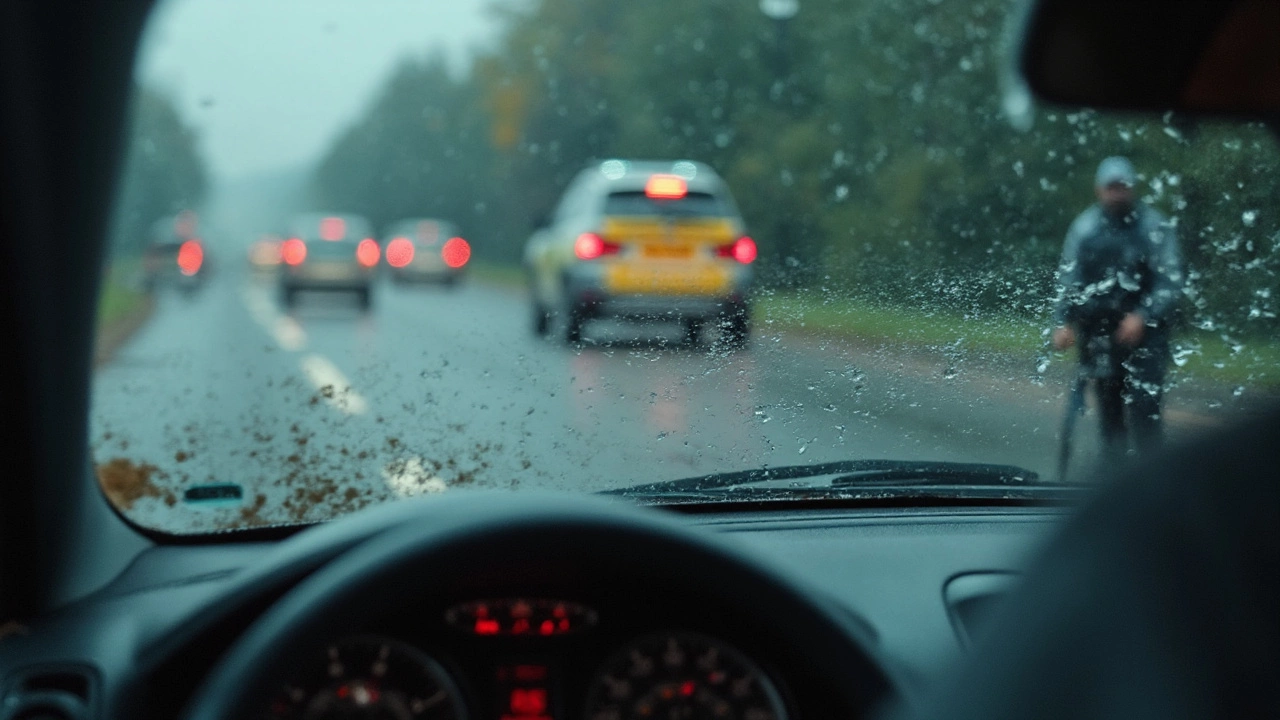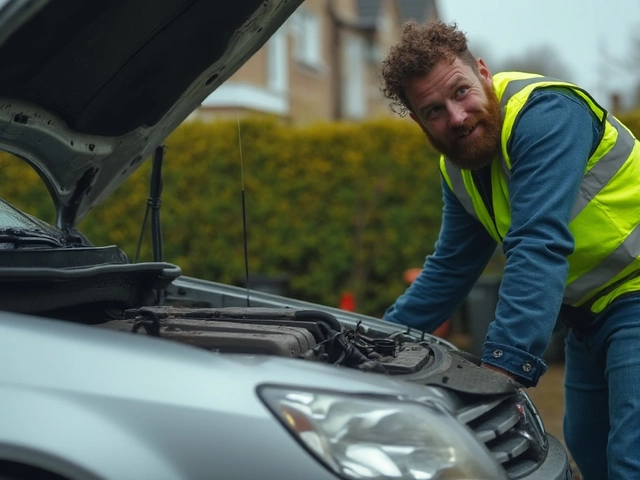Ever stared through a smeared, rainy windshield and felt that weird panic building in your chest? Trust me, I’ve been there. Driving with broken windscreen wipers looks like no big deal when the sky’s clear, but the minute it starts spitting rain, you realize just how critical those little arms are.
If your wipers are busted, you’re not only stuck with lousy visibility, you’re flirting with danger every time the weather turns. It's not just about seeing out—it's about being able to react to whatever pops up on the road. Plus, most places take this pretty seriously, slapping drivers with fines or even pulling cars off the road if those wipers don’t work.
Even if you think, 'Eh, it’s not raining now,' don’t chance it. You never know when you’ll get caught out. Having a plan for dealing with broken wipers before you hit the road saves you headaches, money, and—most important—keeps you and everyone else safer.
- What Happens If Your Windscreen Wipers Break?
- Legal Consequences in Different Weather
- Quick Fixes and Emergency Options
- Long-Term Solutions and Prevention
What Happens If Your Windscreen Wipers Break?
Your first problem is obvious: you just can’t see straight. Even a little drizzle can blur your view and make oncoming headlights look like ghostly smears. And if you hit a stretch of muddy road or a truck splashes your windscreen with dirty water, you’ll wish you’d fixed those wipers last week.
The windscreen wipers are there for a reason—they’re your main backup when anything lands on your windshield, be it bugs, bird droppings, sand, or water. Lose them, and you’re driving almost blind if the weather or road throws something your way.
- On rainy days, tests show that poor visibility causes up to 23% of weather-related crashes. It gets way worse at night or during storms.
- Something as simple as dust can cut your vision in half if you can’t clear it away.
- If it snows or ices up, you’re basically rolling around in a metal box—you won’t be able to see, even if you scrape the glass before driving off.
For a clearer view of how much this matters, check out this quick breakdown:
| Wiper Condition | Visibility in Rain | Reaction Time |
|---|---|---|
| Brand new wipers | Good | Fast |
| Worn or broken wipers | Poor/Very Poor | Slow/Delayed |
| No wipers at all | Almost zero | Dangerously delayed |
In short, once your wipers break, the odds are stacked against you the second the weather changes. It’s not just annoying—it can actually put you, your passengers, and everyone else on the road in real trouble.
Legal Consequences in Different Weather
Believe it or not, getting caught driving with broken windscreen wipers isn’t just a slap on the wrist in most places. Traffic laws make it clear: a driver must have a clear view of the road at all times. That’s why most countries—and every US state—require working wipers as part of the basic roadworthiness rules. When your wipers aren’t working, you can be fined on the spot. The amount depends on your location, but here’s a snapshot of what you’re risking:
| Country/Region | Penalty | Special Notes |
|---|---|---|
| UK | Up to £2,500 fine | Can get 3 penalty points |
| USA (typical) | $80–$150 fine | Could lead to vehicle being deemed unroadworthy |
| Australia | AUD $116–$300 fine | Random roadside checks |
| Canada (Ontario) | CA$110 fine | Ticketed even in light rain |
Let’s talk about how weather changes the rules of the game. If you’re driving in heavy rain, snow, or sleet, cops are way more likely to pull you over for non-working wipers. Even a short trip to the store can end up costing you if the weather turns and your wipers don't do their job.
- If it’s sunny and dry, you might get away with it—until a random police check or unexpected downpour ruins your day.
- Rainy or snowy? Operating a car with broken wipers is pretty much asking for a ticket or worse, an accident.
One forgotten fact: if you get into a crash while your wipers are broken, insurance companies might deny your claim. You’re expected to keep your gear working—period. Driving safety isn’t just about how you steer the wheel; stuff like working wipers is what keeps your name out of those accident reports.

Quick Fixes and Emergency Options
If you find yourself out on the road with busted windscreen wipers, you need a game plan fast. Driving without them in wet weather just isn’t safe, and you can get pulled over or even cause a crash. So what can you do in a pinch?
First, let’s cut to the chase. If it starts raining and your wipers give out, windscreen wipers need immediate attention. Most experts will tell you to pull over somewhere safe and not to risk it. The Highway Code in the UK, for instance, is clear: "Windscreens and windows must be kept clean and free from obstructions to vision."
According to the RAC, "A clear windscreen is a legal requirement, and driving with smudged or water-blurred glass can lead to prosecution and invalidate your insurance."
Here are some emergency steps people try if they absolutely have to get moving for a short distance:
- Apply Rain-Repellent: If you have any rain-repellent spray (like Rain-X) in the glove box, put it on the outside of the glass. This helps water bead up and roll off, making it a little easier to see.
- Manual Wiping: In desperate cases, some people have wrapped a rag around a stick and used it from inside the car at stoplights. Not fun, but better than nothing if you’re crawling home.
- String Trick: There’s an old-school hack where you tie string around both wiper arms, run the string through the driver and passenger windows, and have someone pull the string back and forth to move the blades. Only try this if you have a passenger and need to limp somewhere safe.
Keep in mind, these tricks are only for super-short journeys to the nearest garage or safe spot. If a storm’s coming in hard, just wait it out or call for help.
See how rare wiper failure is? According to a 2023 car breakdown survey in the UK, only about 2% of callouts were for failed wipers, but drivers without working wipers accounted for nearly 7% of all weather-related collisions. Here’s a quick look at why these numbers matter:
| Problem | Breakdown Calls (%) | Weather-Related Collisions (%) |
|---|---|---|
| Windscreen wiper failure | 2 | 7 |
| Engine issues | 15 | 2 |
| Tire blowout | 6 | 10 |
So sure, wiper issues don’t happen every day, but when they do, they’re way more likely to mess up your drive if you don’t fix them right away. Always carry a small bottle of rain repellent and keep an emergency kit with a rag, some zip ties, and maybe even an extra wiper blade. It’s not over-planning—it’s just smart.
Long-Term Solutions and Prevention
If you don’t want broken wipers sneaking up on you, regular checks have to be a habit. This stuff isn’t rocket science, but plenty of drivers skip it until it’s too late. You’re supposed to swap out wiper blades every 6 to 12 months—yep, that often. Extreme temps or parking outside can wear them down faster. Don’t just wait for visible cracks; if your wipers start leaving streaks, chattering, or missing sections, it’s time for fresh ones.
Here’s a quick checklist to keep things working smooth:
- Check for splits or frayed rubber every couple of months.
- Keep your windscreen clean—dirt shortens blade life.
- Don’t use your wipers to clear ice or heavy snow; that’ll mess up the motor and blades.
- Test your wipers and washer fluid before any trip, especially in unpredictable weather.
Getting decent quality blades matters too. Cheap ones just don’t last. Name brands might cost a bit more, but they hold up better, especially in nasty weather. I’ve tried bargain blades before—a couple of surprise downpours later, I swore them off for good.
Still not convinced it’s worth fussing over? Have a look at this:
| Factor | Drivers Affected by Poor Wipers | Legal Issues Reported |
|---|---|---|
| 2019 UK Survey | 21% | 5% (Failed MOT) |
| 2023 US Data | 18% | 3% (Tickets/Citations) |
That’s not a small number of cars failing basic legal checks because of lousy wipers. In the UK, windscreen wipers are a common cause of failed MOT tests. In some US states, you can get a ticket if cops spot your dead wipers, even if it’s not pouring.
If you want zero guesswork, set a reminder on your phone for a check every six months. Or, make it part of your regular oil change routine. Treating your wipers as an afterthought is the kind of mistake you only make once—after that, you’ll never skip those checks again.

